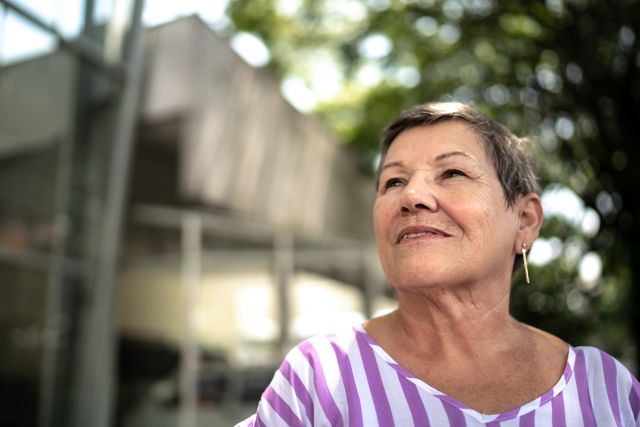Updated on August 2, 2023.
Even if you’re generally a “glass half-full” kind of person, when life gets stressful, it can be hard to look at the glass as anything but knocked over—with grape juice spilled all over your white rug. Whether you are dealing with illness, unemployment, or the loss of people close to you, coping with uncertainty about when life will get back on track can be tough.
So, how do you move forward in a positive way?
The key is resilience. But don’t confuse resilience with immunity to pain or stress. Being resilient doesn’t mean that you never feel down or frustrated when difficulties arise, according to David Palmiter, PhD, a professor of psychology at Marywood University in Scranton, Pennsylvania and a researcher in the field of resilience.
“Resilience is about taking the hit and coming out stronger on the other side,” he explains.
And while it’s true that some people are able to bounce back more easily than others, resilience is definitely a skill that can be learned, Palmiter adds.
“There are some biologically based personality characteristics that make some people more resilient than others,” he explains. “But when you look at the literature on happiness, much of our happiness is determined by choices that we make. We obviously can't change our genes, but we can change how we go about our day-to-day.”
Building up your resilience skills will do more than just increase your mood. In fact, there is some evidence that people with greater emotional well-being are less likely to develop heart disease than their more negative peers.
How to bolster your emotional defenses
The key to building resilience is taking the time to foster habits and behaviors that will help you adapt and bounce back in the face of adversity. These steps may include:
Giving yourself time to grieve. Part of being resilient is confronting your losses head-on rather than ignoring them and hoping the pain will go away.
“There is a real American instinct to say, ‘Oh, buck up, it’s not all that bad!’ or ‘Stop complaining, other people have it so much worse,’” says Palmiter.
But when you don’t adequately address your loss—whether it’s the loss of a friendship or a job—those feelings will inevitably bubble up to the surface later in more damaging ways, says Palmiter.
“Take time to lean into your grief with self-compassion,” he says. Palmiter offers one suggestion on how to do this: Find a quiet space, close your eyes, and picture yourself as a small and vulnerable child. Put your hands on your heart and speak words of compassion to yourself for what you are feeling. Once you’ve had that catharsis, you can begin to adapt and heal.
Be sure to sleep, eat well, and exercise. For your mind to be able to bounce back emotionally, your body needs to stay healthy, and this means getting some exercise every day, eating healthy foods, and maintaining a regular sleep schedule, says Palmiter.
“It’s so easy just to fall into a hole of ice cream, donuts, and lethargy,” he says. “And it’s okay if you have days when you’re not acting with intention, but the foundation of resilience is the tripod of good health.”
In fact, research has shown that people who exercise regularly may have less of a decline in their positive attitude during moments of acute stress than those who are more sedentary.
Stay connected socially. When friends and loved ones are far away or unavailable, it can be easy to fall into a rut of self-isolation and loneliness. But social connections are a key ingredient of resilience, says Palmiter.
“The number one predictor for better outcomes later in life is the strength of your social connections,” he says. Palmiter adds that it’s important to choose a support system of people who lift you up with joy and happiness, rather than those who are constantly negative or bitter.
Practice gratitude. One trait that the most resilient people share is that they can always find something for which they are grateful, says Palmiter. Several studies have shown that the act of writing down what you’re grateful for makes you feel more optimistic about your life—the cornerstone of resilience.
Try keeping a gratitude journal and make a daily practice of jotting down a list of the good things in your life, from the big (your children’s health, your comfortable home) to the small (the smell of your favorite coffee, the fact that your favorite TV show was renewed for another season).
Perform acts of kindness. Stepping away from your problems for a moment and performing a kind act—whether it’s paying for the person behind you in line at the coffee shop or volunteering to tutor a kid who needs help—can help build your own resilience.
“Not only are you proving to yourself that you have the ability to make a difference in your life and someone else’s, but you are literally making the world a better place,” says Palmiter.
Remember that good can come out of bad. Resilient people understand that every crisis provides an opportunity for growth.
“I advise my patients to remember the six worst things that ever happened to them, and then remember something good that came out if it,” Palmiter says.
For example, the loss of someone dear to you may have helped you prioritize spending more time with your family or getting fired may have led you to explore a new career path. “It’s not that you would want to go back and re-experience that difficult time,” he says. “But you can see how it may have made you a better person.”






